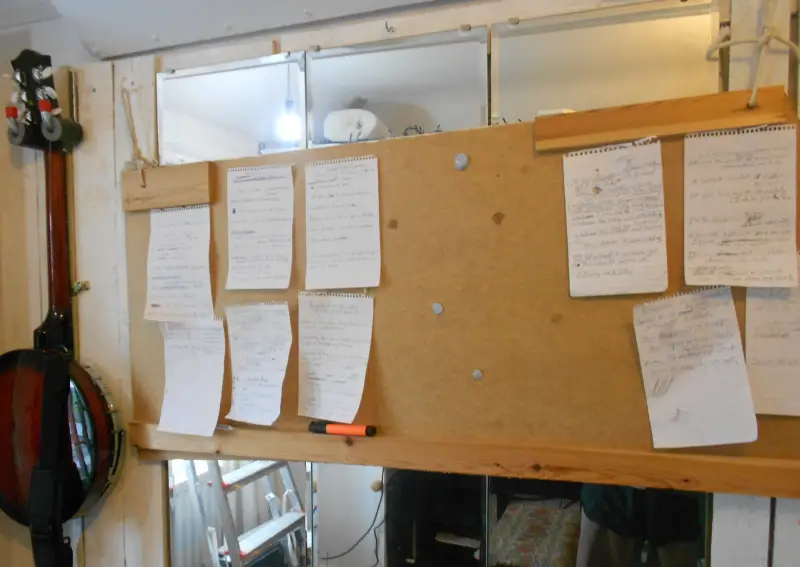How to Write Songs About Absolutely Anything
 Image courtesy of Green Chameleon
Image courtesy of Green Chameleon
The first fundamental to writing any song lies in being able to identify underlying emotions and attitudes. A song may appear upbeat, aggressive, reflective etc. But will always resonate around emotions which are being explored and the attitudes towards them. The second fundamental is having a flexible, reliable writing method which encourages you to focus on your personal creativity.
Tools and Work Area.
This means you have a set time with no distractions, no interruptions, and no other plans.
A peg board, or the back of a door, or use the floor for spreading ideas out so you can see the big picture.
Dictionary, Emotional Compass, Thesaurus, Rhyming Dictionary, Chord Diagrams, Keys and chord patterns. You will need these, no matter what the song is about.
Use one sheet of paper for each theme, verse or idea so that it can be expanded or crossed out and flipped around.
Musical Instrument or DAW.
Think About Context Now.
 Image courtesy of Anna Earl
Image courtesy of Anna Earl
Context is the circumstances in which the song will be heard. It doesn't take long before you realise that context can actually make some decisions for you. For example, if your song is going to performed by you as a solo at a folk club, there's no point in trying to write a big bold aggressive tub thumper. Or if you're a nervous performer, don't make it too difficult to play.
There's also the question of what goes before and after. If you're the opening act of many, be careful about kicking off with a slow number. Think about your other songs and try to make each one distinct or it'll sound like you wrote the same song three times.
Considering context will come naturally as you write more but you should definitely not ignore it.
Identify the Emotions in the Story.
What ever else is going on in your song, there should always emotional conflict or joy. And that emotional hub should be linked to a set of real world circumstances. Don't worry if this seems too complex, it will happen fairly naturally.
The most important skill, therefore, and one which will allow you to write a song about absolutely anything, is to identify the cause of the conflict or joy. Be very specific, find the circumstances and choose the right words to describe it. This may take you a while. It may even appear hidden. Very often you'll have to start writing a song without fully understanding what it's about. You may even finish a song and perform it without really understanding it, but this is rare, and even then when you don't fully understand your message, the emotions, the circumstances and your attitude to them will still be there, driving your song.
Here's a few examples, 'The Smell of Wet Mushy Leaves.' It sounds as boring as hell but that isn't what the song is about. Oh no, the song is about the events and memories which those leaves are associated with. The attitudes and emotions which will forever be rekindled. The wet leaves are merely a hook and if you use them as a hook, a reminder of a time when some emotionally important event happened, bingo ! You have a song about wet mushy leaves.
Another example, 'A House Brick.' Give the house brick emotions. And ask what it's conflict or joy is, ask what the circumstances are which make this a happy house brick. Let's pretend it finally got laid. Not in the sexual sense - but it was cemented into place with a few thousand other house bricks to become a home. Is it happy now or did it prefer being unattached ? Bingo ! A song about a brick.
This last example of writing is using a literary device called 'personification' where we treat objects as people and in doing so, bring them to life.
Lets say you've got nothing. You're so fed up and miserable you can't think of a single damn thing worth writing about. Well how does it feel ? Like crap I bet. So how did you get here ? How do you want to feel ? What would you do to 'Nothing' if it were standing in front of you grinning ? Bingo ! Now you have a song about 'Nothing'.
Lastly, the song where you struggle to identify what it's about. You might have a melody, some phrase or just a short expression which won't leave you alone. You should definitely continue with it because the emotions are deep and your mind is probably protecting you from them. At the same time, you need to explore them. Such is the complexity of the human condition.
The point is, you can't have a song without the emotions which connect humans to conflict or joy, it just won't happen. And even if you can't identify emotions, attitudes, or circumstances, you will definitely feel frustration, have disappointment or despair or disillusionment. So that's what you write about, and your story should explore how and why you feel this way.
So the first words you should be focusing on are emotions. Use an Emotional Compass or Thesaurus to give you options. Try to become intimate the emotions you want to convey. This is what your gonna build your story around. This is what your listener is going to buy into. It's how your gonna make connections that will last a lifetime. It's what every song is about regardless of age, genre or style or what the circumstances are.
There may be more than one word which fits how you feel, that's OK. Just don't overuse those words in the song, that's very unlikely to work. It won't work because it's too blunt, it's overkill, it's 'in your face'. It's telling instead of showing. Your job is to get your listener to feel those emotions themselves. You do that by sharing the story and letting them join the dots. Think of it like dropping breadcrumbs, rather than hitting them with a banjo.
Attitude.
 Image courtesy of Slim Emcee
Image courtesy of Slim Emcee
Instead of hitting your listeners with a banjo, hit them with your attitude.
No matter what a song is about, the singer and songwriter must have attitude. Here's where you get to really show your emotions. Write down what you're gonna do about the hand you've been dealt. Ask what you did to deserve it. Who's to blame ? How should circumstances have been different ? Dwell upon that pain or happiness until it grows and consumes you.
This would be a very good time to put some music around that attitude - nothing fancy - just bash out a couple of ideas to see if anything sticks. Here's a pro tip: the music is going to express those emotions and that attitude. That is why you should get in touch with them musically. This should not be a verse. Aim for a refrain or chorus or hook with this attitude because this is the heart of the song.
I guarantee, if you get your attitude nailed, the song will write itself.
Don't believe me ? Then, let's test this assertion or 'attitude' with a few examples.
How to Write a Christmas Song
A Christmas song is a perfect example of a song which can be about absolutely anything. If you think about it, Christmas songs cover love, death, loss, happiness, sadness, loneliness, war, peace. Hell, some of em even handle the subject of religion.
In the Christian tradition, Christmas has so many angles on the human condition, it's a rich hunting ground for songs and songwriters. All you need to do is get your mind into the attitude of your Christmas experience.
So, if your Christmas is about a partner leaving you, you're going to have a pretty negative attitude. On the other hand, you may meet up with family for the first time in ages.
So you see, it all starts with your attitude and emotions. That determines your rhythm and the rhythm determines the instruments you'll use and pace and tempo etc, etc. The slay bells, the drums, the violins and the choir. All these depend on your attitude to Christmas.
So get your attitude and emotions first - then use the trappings of Christmas to give context.
"Under the decorated tree
I thought you'd be making love to me
but you used the snow to make excuses
and that tree reminds me, I'm the one who always loses"
And you could then create a chorus about how you "hate the smell of pine" and "fur encrusted floozies," because the keep telling you that you're the one that loses.
You can easily work backwards from an emotion you don't understand too.
Let's say you hate the smell of pine trees but never understood why - well maybe this is why or maybe you make some story to explain why ?
And the obvious question on everyone's lips - 'what do we do if we have no particularly strong memories or attitudes or emotions around Christmas ?'
In that case you'll have to use another event and pretend it was at Christmas. If you can't do that you're screwed. Cos you can't create a song about nothing, because then your song must be about 'nothing' and how you feel about it - so there's no excuse for writing dull, unanimated, songs which lack passion. I've explained this in an earlier paragraph.
How to Write a Song About a Boy or Girl
This is even easier because we tend to have pretty strong feelings about our significant others.
Your approach should be just the same. Find a few phrases which encapsulate your emotions and attitude toward this person. If you don't understand them just go with what you can verbalise.
Let's go with "I love being around you." That's pretty innocuous, don't you think ?
Now, focus on the person you desire and write down all the things you love about them, that should be easy and you should end up with a long list, for example.
Hair is long and full and dreamy.
Eyes are the same as mine.
Make me laugh
Skin makes me hungry
The smell of you neck
etc etc
Now think about how you could be around this person all the time. There's an obvious answer.
"If I were a breeze -
I'd wrap myself around you
so I could feel you laughing and the touch of your skin
then I wouldn't be so hungry,
I'd breathe in while your hair fell around the fragrance of you,
we were bathing in."
So here again, we start with an attitude and emotion, and build a context around it. You could take these lyrics into any Genre and they'd work. They'd work because it doesn't matter if the song is about Christmas or another person. The attachments we have are the same.
How to Write a Song About a Cat or Dog
Find your attitude and emotion and keep that separate. Then make a list of features particular to your animal.
Use those features to set the context and lead you to the heart of your song, for example.
Always there
My best friend
No one else
Happy smile
When you purr
You are home
You are honesty
Not surprisingly, we end up with the exact same sentiment that we do over a significant other - we just love being around them.
The song is then just a question of your tiny details, your special relationship with your animal. And be sure to be specific - don't get your dog mixed up with your dad or it could be awkward.
If you can find a good metaphor like I used a breeze to get around your subject, that's gonna make an outstanding song. It's just a question of expanding your thought process.
How Mind Maps Expand Your Thinking.
A good way to focus on your attitude and emotions, and expand the thought process, is to doodle a mind map around what you have. Include pieces of story, the day, the season, the weather. Make comparisons. Ask why and how you arrived at this point. Draw pictures, free write short bursts or captions. Include anything and everything because this is where you might stumble upon that killer hook or phrase which becomes your title. Fast and loose is the way to proceed.
Identify with your Hook or Title or Refrain or Chorus.
While you're doing all this, if anything catches your imagination, or seems so unusual that it won't leave you alone, that's the idea to follow. Even if you're not sure about it, especially if you're not sure about it. This is not place to limit yourself, be free because one of those ideas is going to make a great hook or title or refrain or chorus. Make sure you highlight it or set it to one side.
Go to Your Instrument.
What ever your word or hook or phrase is, sing it out like you really mean it. Use your instrument to find a rhythm. Sing it high in pitch like it's the main part of the song - because it probably is. Let your soul pour out into the silence and paint it with your emotions.
The melody may be hidden in your attitude. Spit the words out like they're gonna hit something and the expression will help you find how you should be singing it. This will help you get a melody.
This works for ballads too. Try it.
Chose Your Method
 Image courtesy of Priscilla Du Preez
Image courtesy of Priscilla Du Preez
Don't worry if you don't have an epic yet. If you only have an idea or a short phrase about the heart of the conflict which you're trying to illustrate, that's exactly where you should be. The key to being able to write a song about absolutely anything is realising that the hardest work is identifying the nub. Now that you have that, choose how your gonna write it.
How you write will depend on your personality. You might like to write a poem or tell a story long hand in prose. You might like to use an instrument to guide the ebb and flow of it. You may like to use a song template and fill the blocks or blurt out unconnected phrases. It makes no difference and there's no right or wrong approach, you just have to follow your heart and lead your listener toward your pain or joy.
One Subject Per Verse Please.
Each verse should be a new event, a new chapter in the story. It should focus on that one event and not wander into other unrelated areas or go back over old stuff.
You might wanna break your verses into days of the week or seasons or just events. Each should be more intense than the last, more twisted, more happy or cruel so that the song builds to a point instead of meandering into yawnsville.
Does it make sense ? Does it have to ?
The reason anyone can write a song about absolutely anything is because songs don't always have to make sense. A nice melody and catchy chorus is often enough.
That song which you don't quite understand might fit into this category. The chances are it'll be reflective so your audiences can sense your level of confusion, let them buy into and feel your 'inability to grasp.'
By and large, it's better if songs do make sense because it commands respect and demonstrates respect for your audience. So it's worth keeping your eye out for any obvious errors.
Rinse and Repeat
Once you get enough material, and providing you can see it all before you, a pattern or a logical sequence will jump out at you. If not, you just need to keep jiggling things round until it does.
You'll probably have to keep playing it over and over for a bit. You might find it won't leave alone and it'll keep tugging at you, waking you up in the middle of the night until it sounds right.
Whilst doing this, your tune and chords will become more obvious because the song will tell you how it's supposed to go, seriously it will.
Leave to Cool, Cure and Mature.
 Once you've finished, it's imperative that you leave the song alone for at least a week. The reason for this is because every song you write will seem like the best song anybody has ever written. This one may indeed be the best song anyone has ever written, but it's best to be sure before you unleash it. So don't look at it or play it or think about and if you find yourself humming it, put it out of your mind.
Once you've finished, it's imperative that you leave the song alone for at least a week. The reason for this is because every song you write will seem like the best song anybody has ever written. This one may indeed be the best song anyone has ever written, but it's best to be sure before you unleash it. So don't look at it or play it or think about and if you find yourself humming it, put it out of your mind.
That's easier said than done, especially if it's a good song. When you come back to it and it still feels good, then you'll know it's finished.
A Brief Checklist.
- 1. Tools and work area.
- 2. Consider context now.
- 3. Separate the emotion from the story.
- 4. Attitude.
- 5. Mind map a doodle around 3 & 4.
- 6. Identify with your Hook or Title or Refrain or Chorus.
- 8. Go to your instrument.
- 7. Chose your method.
- 9. One subject per verse.
- 10.Does it make sense ?
- 11.Rinse and repeat.
- 12. leave it to cool, cure and mature.
